|
|
|
Sort Order |
|
|
|
Items / Page
|
|
|
|
|
|
|
| Srl | Item |
| 1 |
ID:
184224
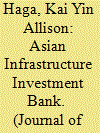

|
|
|
|
|
| Summary/Abstract |
In 2013, China's growing economic capacities motivated Beijing to launch a multilateral bank to advance its diplomatic agenda. Scholars are still debating precisely what Beijing seeks to accomplish through the Asian Infrastructure Investment Bank (AIIB). This article surveys the key literature on the AIIB, identifying twenty scholarly interpretations of Beijing's strategic goals. The purpose of this research is to understand Beijing's initial design for this bank and evaluate whether this new multilateral development bank can function as an effective instrument for Beijing's economic statecraft. Over its first five years, as an economic tool for Beijing, the AIIB has performed quite remarkably well. The bank not only operates smoothly, generating a reasonable amount in net income for its shareholders, but also serves Beijing's strategic purposes in expanding China's regional influence, enhancing its international status, and ascending toward global leadership.
|
|
|
|
|
|
|
|
|
|
|
|
|
|
|
|
| 2 |
ID:
184222
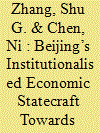

|
|
|
|
|
| Summary/Abstract |
This study adopts an institutional approach in the case analysis of China's economic statecraft towards Brazil. In light of institutionalisation theory, it examines the institutional arrangements between Beijing and Brasilia for the purpose of facilitating bilateral economic cooperation and advancing strategic partnership. As a descriptive effort, it yields some preliminary findings: first, the institutionalisation of China's economic statecraft towards Brazil is incremental, driven largely by the desire for and belief in long-term planning; second, a set of norms, values, and principles is instituted alongside designated agencies, point persons, operational protocols, and exchange mechanisms, creating a form of institutional governance based on a multi-actor, multilevel, and network-based steering mode; third, governance remains so centralised that it falls short in empowering strategic participation; and, fourth and finally, Beijing's institution-building proves useful in the management of relations with Brazil, suggesting that economic statecraft may benefit from institutionalisation.
|
|
|
|
|
|
|
|
|
|
|
|
|
|
|
|
| 3 |
ID:
184225
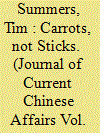

|
|
|
|
|
| Summary/Abstract |
This analysis offers a historical assessment of “economic statecraft” in Beijing's approach to Hong Kong from 1997 to 2020. It discusses how the concept of “economic statecraft” can be applied to Beijing–Hong Kong relations given the nature of the “one country, two systems” framework, and looks at some differing perceptions about economic statecraft in Hong Kong. It argues that, during this period, economic tools were in general used by Beijing relatively sparingly, and in the form of inducements rather than coercion. In conclusion, the analysis suggests that the contested interpretations of Beijing–Hong Kong economic relations demonstrate that “economic statecraft” is to a certain extent in the eye of the beholder.
|
|
|
|
|
|
|
|
|
|
|
|
|
|
|
|
| 4 |
ID:
184220


|
|
|
|
|
| Summary/Abstract |
This article focuses on one of the most fascinating features of contemporary Chinese foreign policy, namely the use of economics as a tool of national power. This article seeks to provide a foundational context for the study of China's economic statecraft. The first portion of this article builds upon existing work to frame the phenomenon of China's post-Cold War economic statecraft. I then offer a rough periodization of this post-Cold War era highlighting key events and strategic turning points for China. I distinguish three major periods: integration into the global economic system following the post-Tiananmen isolation (1989–1997), a decade of win-win diplomacy (1998–2008), and emerging great power economic statecraft (2008–2017). The piece concludes with a proposition that we may be witnessing the early stages of a fourth phase as well as some considerations for the future study of Chinese economic statecraft.
|
|
|
|
|
|
|
|
|
|
|
|
|
|
|
|
| 5 |
ID:
184223
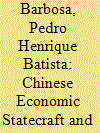

|
|
|
|
|
| Summary/Abstract |
Over the last years, Brazil and China's oil-related finance activities have expanded substantially. Between 2007 and 2019, Brazilian companies received approximately one-fourth of Chinese policy banks overseas oil-related loans, and Chinese financial institutions became Brazil's biggest oil company Petrobras’ main creditor. A deep analysis of these loans highlights their usage as economic statecraft tools, with impacts on the bilateral crude trade and investments. Loan-for-oil mechanisms, content purchase requirements, and a countercyclical lending pattern have helped to influence Brazilian players to behave in a manner conducive to the Chinese state's energy security objectives and strategic goals, namely increase of imports, diversification of sources, and internationalisation of firms. With these loans, China has satisfactorily guaranteed a stable oil supply over time and has helped Chinese equipment makers and service providers to expand their footage in Brazil.
|
|
|
|
|
|
|
|
|
|
|
|
|
|
|
|
| 6 |
ID:
184221
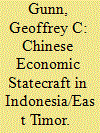

|
|
|
|
|
| Summary/Abstract |
From inside China’s Belt and Road Initiative (BRI), two southern tier nations offer contrary perspectives as to the efficacy of Beijing’s economic statecraft, namely Indonesia and East Timor. While obviously asymmetric in practically every respect, nevertheless a careful study of these two nations’ bilateral links with China over long and short times offers salutary lessons on infrastructure financing in particular. Several interconnected inquiries are interposed. In a nation known for its competing political elites and support bases, how successful has China been in micro-managing its relations with Jakarta over trade and investment deals even carrying through to a post-authoritarian order? How has newly independent albeit aid-dependent Timor-Leste been able to parlay the China connection? Mixing documentary with primary research in situ, the inclusion of the East Timor case adds a missing link in the growing literature on the BRI.
|
|
|
|
|
|
|
|
|
|
|
|
|
|
|
|
| 7 |
ID:
184219
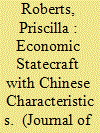

|
|
|
|
|
| Summary/Abstract |
The term “economic statecraft” is increasingly employed to describe China's use of economic resources to pursue objectives spanning the political, economic, and strategic spheres. One recent study suggests that “China's sophisticated use of economics in its foreign policy is still a fairly recent phenomenon.” Yet close scrutiny of how since at least the early 1900s Chinese leaders sought to use economic leverage as a foreign policy instrument suggests that the antecedents of contemporary Chinese economic statecraft date back to the founding of the People's Republic of China and even before. This special issue represents an effort to explore in some depth in what ways post-Cold War Chinese economic statecraft does indeed represent a novel phenomenon, as opposed to the simple continuation of earlier trends; to identify its most important features and follow its evolution over time; and to investigate in detail several specific recent case studies.
|
|
|
|
|
|
|
|
|
|
|
|
|
|
|
|
|
|
|
|
|